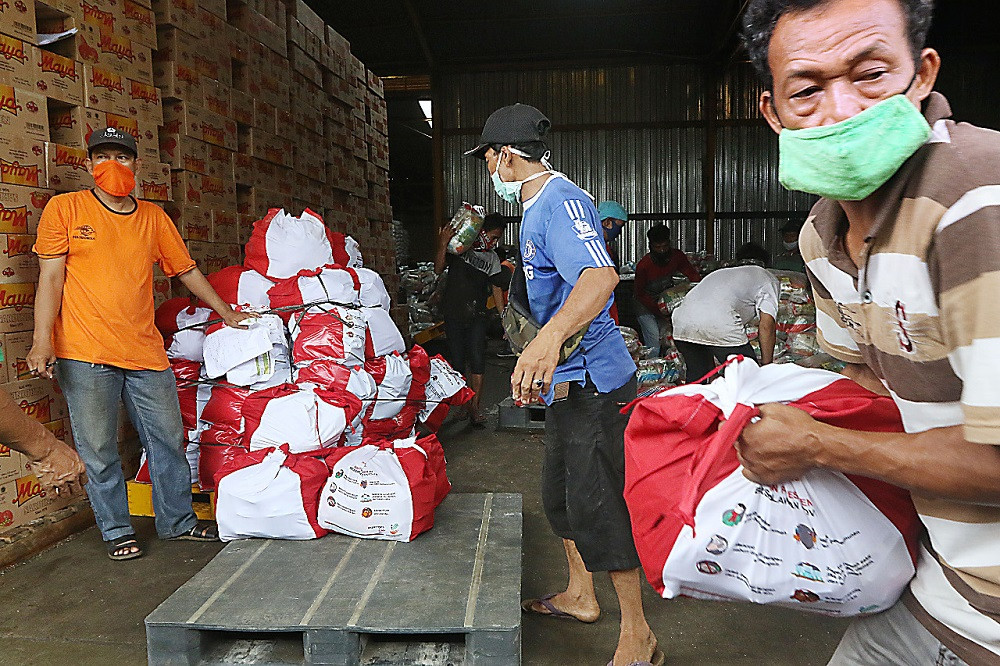Popular Reads
Top Results
Can't find what you're looking for?
View all search resultsPopular Reads
Top Results
Can't find what you're looking for?
View all search resultsAccurate social aid data still eludes government
Change text size
Gift Premium Articles
to Anyone
T
he government has committed to assisting citizens hit hardest by the COVID-19 outbreak until the end of the year, but persistent issues of data reliability have complicated efforts in the capital and other regions.
In a recently published study by the SMERU Research Institute conducted between late April and mid-May in five cities and regencies of the country, researchers found instances where government social assistance ended up in the wrong hands.
The study found that 400 of the 2,000 listed recipients surveyed in a certain district should have been ineligible for aid, either because they had escaped poverty or were already deceased.
The study did not specify which region this data was from.
Jakarta began its social assistance program on April 9 and committed to support the 2.2 million households most affected by the COVID-19 outbreak. The program, which will continue to disburse monthly aid until December, involves the central government, which has committed to supporting the majority of potential recipients, roughly 1.3 million people.
Pepen Nazarudin, the Social Affairs Ministry’s director general for social empowerment, said the number of recipients was fixed and could not be changed. He said it was the city administration’s responsibility to determine which recipients should be prioritized.
Early on in the program, the lack of reliable recipient data caused a number of logistical problems, including mistargeted aid, which Jakarta Governor Anies Baswedan complained about in April.
After four months of running the program, the city has seen improvements in its services, although shortcomings remain.
“Social aid disbursement for stages two to four [conducted from May to mid-July] has reached 100 percent, which means that all of the assistance has been disbursed,” said Ika Yuli Rahayu, the Jakarta Social Agency’s head of social security protection, on Wednesday.
Ika acknowledged that some ineligible recipients had been discovered during the disbursement process and that local authorities usually looked for the next eligible person to give the aid to.
“There were still one or two [ineligible recipients] that we found, but this didn’t occur in every subdistrict,” she said.
The official said that when the recipient was deceased or had been registered to the wrong address, the next recipient would be determined based on the recommendation of the neighborhood unit (RT), community unit (RW) or subdistrict head.
People who were not registered as recipients but were eligible for social assistance could also be considered, she said.
Jakarta RT/RW Forum chairman Muhammad Irsyad said that human error was one reason why aid still ended up with ineligible recipients despite an updated database.
Jakarta Deputy Governor Ahmad Riza Patria said last month that data problems had occurred because different institutions employed different methods to process recipient information.
But Irsyad also said that the implementing authorities had improved since the early days of the program and that officials would try to quickly resolve outstanding cases.
“There is no more of the turmoil that we experienced at the outset,” he said.
The National Development Planning Agency (Bappenas) recently revealed that only 113 of the country’s 514 municipalities and regencies had updated their data on the Social Affairs Ministry's Integrated Data for Social Welfare (DTKS) site, a database of poor and vulnerable families.
The regions with updated data were predominantly located on the island of Java, as well as the Bangka Belitung islands and Nusa Tenggara.
Semarang in Central Java, Bojonegoro in East Java and Pariaman in West Sumatra were among the few other regions that had provided new data, Bappenas director of poverty alleviation and social welfare Maliki told The Jakarta Post.
In Jakarta, some municipalities have managed their data well, but that data’s accuracy – whether the listed recipient is eligible in real life – is a different topic altogether, Maliki said.
The government relies on the National Social and Economic Survey (Susenas) to evaluate data accuracy. “The Susenas in September of this year will be a good opportunity to evaluate the accuracy of social aid programs, as the survey will include disbursements for the previous four months,” he said.
About 1.63 million Indonesians fell into poverty between September 2019 and March of this year as the COVID-19 outbreak took a toll on the nation’s poor, Statistics Indonesia (BPS) data shows.
Jakarta recorded that 1.11 percent of its population had fallen into poverty, the highest percent increase of any province. Now, 4.53 percent of its citizens are considered poor.
“Jakarta's poverty rate is the highest in the past decade and even approaches Jakarta’s condition 20 years ago [4.96 percent],” the Jakarta Statistics Agency wrote.
In addition to social assistance for poor families in the capital, the city administration has also distributed staple food to people thought to have the illness and people who are self-isolating in RWs declared "red zones".
More than 6,000 families from the 48 subdistricts in mainland Jakarta and the four islands of the Thousand Islands that had been declared red zones as of July 13 were listed as eligible recipients of social assistance.










